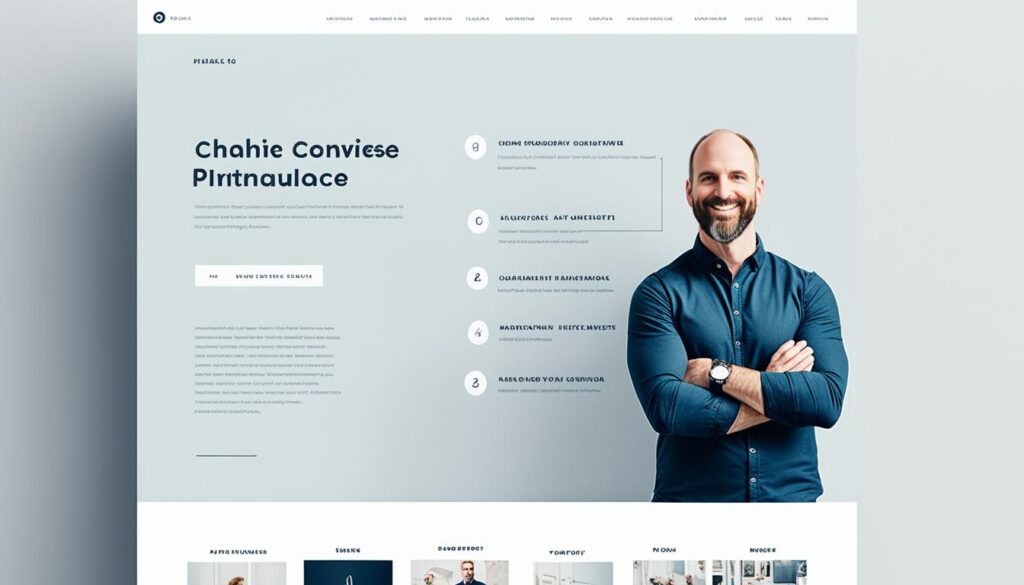Physical Address
304 North Cardinal St.
Dorchester Center, MA 02124
Physical Address
304 North Cardinal St.
Dorchester Center, MA 02124

Making the leap from full-time to freelance work requires strategic planning and preparation to secure a steady income stream, build a client base, and maintain work-life balance.
Over 57 million freelancers work in the United States. They enjoy the flexibility and earning potential freelancing brings. But, moving from a full-time to freelance job isn’t easy. This article is your guide. It gives you the knowledge and strategies needed to make a smooth transition. You’ll learn how to live the freelance life, earn a reliable income, and grow a successful freelance business.
Turning to freelance work from a full-time job needs careful planning. You must find ways to make a steady income, get clients, and balance work and life. Freelancing lets you work when and where you want. Plus, you can earn more. But, it also has its challenges. You need to think about the good and bad of freelancing, along with the opportunities it presents.
Knowing your skills and how they match market needs is vital. Look at what you’re good at, what you can improve on, and what skills you lack. This self-examination helps you see what makes you valuable. It also shows you where you need to grow. Your hobbies can lead you to a fulfilling career too. When you love what you do, it often shows in your work as a freelancer.
Going into freelancing means dealing with ups and downs. You should be realistic and ready to change your plans. It’s wise to look at your money matters. This includes cutting back on spending and saving for emergencies. Since freelancers don’t have a steady paycheck at first, their income can fluctuate. Make sure you have enough savings to cover your costs when money is tight.
Figure out your skills and see if there are any gaps to fill. Self-improvement and staying current in your field are key. Knowing what you’re good at and what you can still work on is important. It helps you focus. This way, you can learn new things and offer more to your clients. This keeps you competitive in freelancing.
Knowing your skills is one thing, but you also need to know what the market wants. Keep an eye on trends and popular services. This makes your chances of success higher. It’s also important to understand what people are looking for. This knowledge lets you choose your services wisely. It helps you make the most of new opportunities.
A solid business plan is key to succeeding in freelancing. It should list your business goals, target clients, and how to achieve them. It’s vital to pinpoint your niche market and customize your services to fit their needs perfectly.
Finding your niche in the freelance world is critical. By matching your skills with your target client’s needs, you’ll raise your success chances. Showing off what makes you unique and your special skills is crucial. It helps attract the perfect clients for your freelance business. This will pave the way for growth.
It’s important to set easy-to-understand goals and time limits. Doing so allows you to track and adjust as needed. A detailed business plan is like your personal roadmap. It leads your freelance venture towards growth and profitability. Always review your goals and update your strategies to stay on track.
Creating a solid marketing and client acquisition strategy is vital. It helps you secure your first clients and grow a lasting freelance business. Strategies may include networking, using social media, and building a professional online presence. Actively engaging with industry connections and promoting your services effectively is key. It helps in attracting good clients and ensuring a stable freelance income.

Building a big financial safety net is key for a successful freelance career. Start by budgeting and cutting out any expenses you don’t need. Save up to help yourself through the first part of your freelancing journey.
Remember, you won’t always earn the same each month when you’re freelancing. It’s smart to keep money for things like taxes and healthcare. Knowing how much money you need to live on during this change is crucial.
Slash your monthly spending to make your way into freelance work easier. This helps lower the amount of money you need each month. Look at what you spend on the most and see where you can save, like not eating out as much or cutting on subscriptions.
By spending less every month, you’ll handle the unpredictable nature of freelance work better.
Having a big emergency fund is also very important. It should cover 3-6 months of your costs. This safety net will help you deal with slow work times or unexpected bills without major stress.
It’s crucial to build and keep up a strong emergency fund for your freelance success.
In today’s world, being visible online is key for freelancers. Keep your profiles up to date to show you’re active and reliable. It’s also vital to have a portfolio website, use social media, and perfect your online profiles. Doing these things will help you stand out and catch the eye of clients.
Your portfolio website should not only look good but also talk to the people you want to work with. It shows what makes you great at what you do. Keep it fresh by adding new projects and skills regularly.
Platforms like LinkedIn are great for growing your personal brand. Be active by posting, joining conversations, and making the right connections. This will help others see you as a trusted freelancer.
Make sure all your profiles look good and tell your story well. Use the right words, a strong bio, and a good photo to build a solid personal brand. Updating your profiles often shows you’re serious and keeps you in clients’ minds.

Building a network is key to getting your first freelance jobs. Go to industry events, participate in online groups, and connect with other professionals. This can lead to your first projects and insights into freelancing. Happy clients are your best cheerleaders, pointing you towards more work with their recommendations.
Staying active in your network, going to events, and using referrals are good ways to find clients. At events and meetups, you can meet potential clients and show what you know. You also get to keep up with what’s new in your field.
Use your current network, such as friends, former classmates, and colleagues, to land your first freelance gigs. Talk to them about what you offer and ask for referrals. Happy clients are likely to help you because they know you do good work.
| Statistic | Value |
|---|---|
| Percentage of workers globally engaged in freelance work | 47% |
| Projected global freelance platform market size by 2027 | $9.19 billion |
| Recommended savings to cover living expenses before transitioning to freelancing | At least 6 months |
| Percentage of successful freelancers who attribute their success to networking | 65% |
| Percentage of freelancers who emphasized the significance of an online portfolio and digital presence | Over 70% |
Being a freelancer means time management is key for your work success and a healthy life balance. Start by making a schedule with time for your work, tasks, and to grow professionally. Use tools like digital calendars and software for managing tasks. This helps you avoid multitasking and focus better, which makes you work more efficiently.
Choosing a work area is crucial for your productivity as a freelancer. This could be in your home, a shared office, or both. Having a space just for work, away from distractions, helps a lot. It keeps your mind on your tasks and not on personal stuff. Also, ensure your workspace is comfy and supports good posture to prevent tiredness during long hours.
Try different time-management tips to work more efficiently. For example, the Pomodoro technique suggests working for 25 minutes straight then taking a break. Or, the 80/20 rule says focus on tasks that make the biggest impact. Be sure to check your plan regularly and adjust it. This will help make sure you spend your time wisely.
Using various tools and apps can really help you better manage your time and workflow. Things like digital calendars, task organizers, and software for project management and time tracking are very useful. Look into what’s available and pick what matches how you work best.

Moving from a full-time job to freelancing needs a smart plan. Think about slowly moving over. You can keep your full-time job while starting to build your freelance work. This way, you lower the risk of money trouble.
Before you jump into freelancing, look closely at your current job. Is it making you happy? Are you financially stable? Think about these things. It helps you decide if it’s the right moment to go freelance.
Don’t just quit your job. Slowly making the shift can be safer and steadier. Keep your current job as you find more freelance work. This way, you worry less about money and make a smoother change.
When you start freelancing, it’s key to set some rules with your clients. Tell them when you’re available and how much you can work. Be clear about the changing times. This helps you keep a good balance and prevent burnout.
Take it slow when you’re starting out on your own. This careful approach can lead to a freelancing career that lasts and thrives.
When you start freelancing, dealing with legal and financial matters is key. You should pick the right business type for your situation. You might choose a sole proprietorship, LLC, or a corporation based on your needs and tax rules. It’s smart to talk to an expert to find what works best for your business.
Know your tax duties and ways to save money. Freelancers must pay their own Social Security and Medicare taxes. By keeping detailed financial records, you’ll be ready for tax time. Working with a tax expert can also help you find tax breaks and lower what you owe.
Getting paid as a freelancer relies on good invoicing. Make a clear, easy-to-understand system for sending out bills. Online tools or software can make this smoother. This way, you’re more likely to get paid on time, keeping your cash flow strong.
Freelancing changes fast, making it important to keep learning. Look for new trends and tech in your field. Take online classes, go to workshops, or get certified. Offer different services to match what’s needed. This keeps your work interesting and in demand.
Freelancers must know the latest trends to stay ahead. Keep an eye on what’s new in your field. Go to events, read key publications, and join online groups. This helps you keep your skills sharp.
It’s key for freelancers to always be learning. Take classes, attend workshops, or get certified. This adds to your knowledge and makes you more valuable to clients. It also helps you stand out from other freelancers.
Keep your services fresh to draw in a bigger client base. See what the market wants and add new skills. Offering different but related services can boost your earnings. It makes your business more flexible and profitable.

Keeping a good work-life balance is key for a freelancer’s success and health. The freedom of freelancing can blend work and home life. So, it’s vital to practice habits that keep life in balance.
Setting achievable work goals and income targets is crucial. Trying to do too much may lead to burnout and hurt your mental health. Know what you can realistically do and be honest with how much time you need for tasks. Let clients know your limits and availability.
Taking regular breaks is important to stay sharp and avoid burnout. Don’t work all the time. Make a schedule that includes time for yourself. This helps you come back to work with a clear mind and more energy.
For a freelancer, taking care of yourself should always come first. Activities like exercise or hobbies can boost your mind and body. Stay connected with others and get help if stress or anxiety is overwhelming. Putting your health first helps you do well in freelancing.
Switching from a regular job to freelancing needs careful thought and a solid plan. Start by checking if you’re ready and have the needed skills. Then, craft a business plan and set up a financial safety net.
It’s also key to have a top-notch online image. This means networking, finding first clients, managing your time well, and taking care of the legal side. These steps are crucial for a smooth start.
Keep learning and developing your skills, aiming for freelance success. A healthy work-life balance is important too. With the right attitude and hard work, freelancing can offer great freedom and prosperity.
The demand for freelancers is rising, making it an ideal time to dive into the freelance world. It’s a chance to find a healthy work-life balance while doing what you love. Make the most out of this growing freelance market.
Embrace this change from a 9-5 job to working for yourself. It opens up a world of freelance opportunities that fit with your skills and lifestyle. Approach it with a positive outlook, and your freelance journey can lead to real satisfaction.